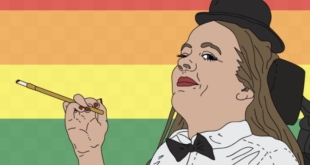Hilary White
LifeSiteNews
August 23, 2013

I have been asked recently “what is homosexualism?” I started using the term in my writing on these issues a few years ago when it became clear that we were dealing not with a group of people, but with a particular ideology that is often held by people who are not themselves homosexuals.
A few days ago in The Guardian, Peter Tatchell wrote a pretty good description not only of that ideology’s goals but its origins. This political ideology, often called “queer theory” by its proponents in academia, is what is being pushed, quite openly these days, by the “gay rights” movement. Despite what we are told all day by their collaborators in the mainstream media, from the six o’clock news to your favourite sit-com, this movement is not about “equal rights”. It is about re-writing the foundational concepts of our entire society. I predict that it will not be much longer before the pretense of “equality” is dropped, having done its work.
Many people are scratching their heads and asking how we have suddenly found ourselves at the point where two men can be “married,” a woman can be called a “husband” and a man, a “wife,” and children are reduced to political bargaining chips in the adoption wars, when it seems just yesterday we were only talking about equal rights. Since when do “equal rights” mean deconstructing, dismantling, these foundational social concepts?
If we read them closely, however, the activists themselves have begun to explain it in quite straightforward terms. For them, it has never been about “equal rights” but about the re-writing of our entire social order. The “gay rights” movement has always been, in Peter Tatchell’s own words, “revolutionary, not reformist.”
Others have pointed out the Marxist origins of the Sexual Revolution as a whole, and it is clear that the sudden explosion of homosexualism is merely the next logical step in a systematic programme. A close cousin to radical feminism and grandchild of Marxism, homosexualism was developed out of the politico-academic pseudo-field of “gender studies” and has, for 30 or 40 years, been pushed on a mostly unwilling public, through “anti-discrimination” and “equalities” legislation by a coalition of lobbyists, NGOs and politicians on the extreme left, and in increasingly powerful international circles.
Peter Tatchell is a prominent British homosexualist, which means he is a proponent of a specific political and social ideology that he wants to see adopted in British society and elsewhere. He is also a homosexual man, that is, he experiences sexual attraction for other men, a condition whose origin is still debated by doctors, psychiatrists and geneticists. The two things are not the same. This is a fact that tends to escape a lot of people who read and write about the Culture Wars, especially in its current manifestation that seems to have suddenly become all about homosexuality. Not all homosexuals are homosexualists, and not all homosexualists are homosexuals.
Tatchell’s Guardian piece was a paean to a document put together in 1971 by what he describes as a collective of “anarchists, hippies, leftwingers, feminists, liberals and counter- culturalists” to bring about “a revolution in consciousness”. He called the “Gay Liberation Front: Manifesto” “a pioneering agenda for social and personal transformation” that started with the proposal that “subverting the supremacy of heterosexual masculinity was the key to genuine liberation.” Tatchell said it was the book that changed his life.
The Manifesto sums it all up, Tatchell says, by “critiquing” “homophobia, sexism, marriage, the nuclear family, monogamy, the cults of youth and beauty, patriarchy, the gay ghetto and rigid male and female gender roles” … the whole kaboodle of the sexual revolution.
The Manifesto itself is quite blunt about identifying the main enemies to defeat: “The oppression of gay people starts in the most basic unit of society, the family.”
“Consisting of the man in charge, a slave as his wife, and their children on whom they force themselves as the ideal models. The very form of the family works against homosexuality.”
 Daily Stormer The Most Censored Publication in History
Daily Stormer The Most Censored Publication in History


